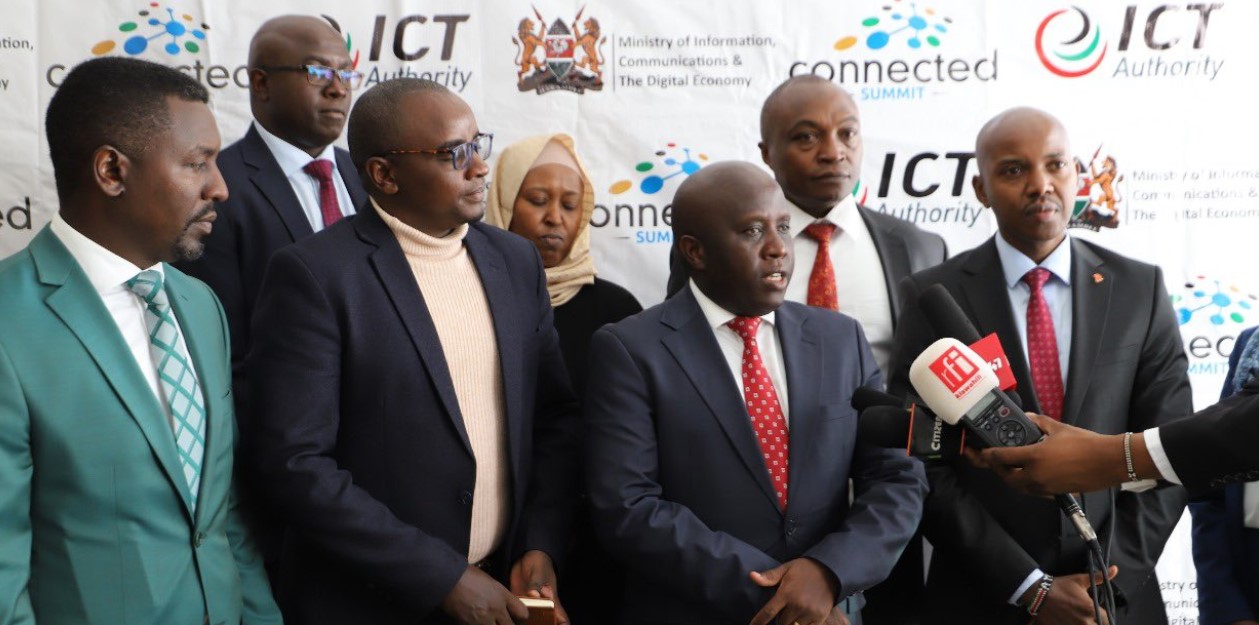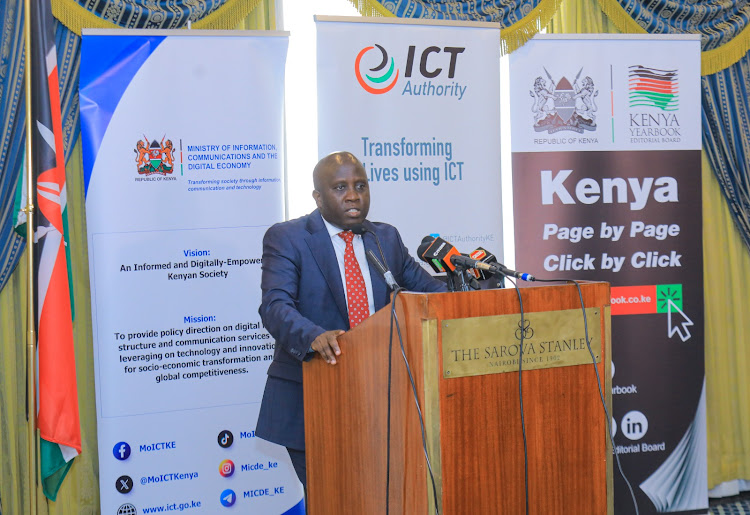Kenya seeks to be Africa’s digital leader with continental summit

Bridging the digital gap and enhancing accessibility to services, in collaboration with the media, will also be discussed at the summit.
The Ministry of Information, Communications, and the Digital Economy (ICT) is actively striving to position Kenya as the premier digital leader in Africa.
ICT Principal Secretary John Tanui, made the declaration while speaking at a breakfast briefing regarding the upcoming Connected Africa Summit 2024, scheduled to take place at Uhuru Gardens in Nairobi from April 21 to 25, this year.
More To Read
- Kenya calls for united African front against rising cyberthreats as regional forum opens in Nairobi
- Kenya least vulnerable to fraud in East Africa but still among world’s riskiest - report
- Activist files petition challenging Cybercrimes Act 2024 over free speech fears
- MPs back Bill empowering authorities to shut rogue websites, deactivate accounts
- Activist petitions IEBC to prove security of election systems amid spyware, AI threats
- CBK launches new cybersecurity centre to combat rising financial sector threats
Tanui emphasised that discussions at the summit will centre around indigenous digital platforms, cyber security, and data security. It will also address supporting start-ups across various sectors, fostering global connections within the private sector, and cultivating collaboration among the media and private enterprises.
He further emphasised that bridging the digital gap and enhancing accessibility to services, in collaboration with the media, will also be among the priority topics.
Stanley Kamau, the Chief Executive Officer of the ICT Authority, stressed the priority of achieving nationwide connectivity, recognising existing disparities in internet access considering the low fixed internet penetration across the continent.
Kamau mentioned that the summit will not only reflect on past achievements like the establishment of Huduma Centres and the government digital platform, eCitizen, but also delve into digital trade independence, skill development, and the future of work, encompassing emerging technologies such as artificial intelligence (AI).
The Connected Africa Summit 2024 aims to chart a path towards Africa's digitally empowered future, fostering unprecedented growth and prosperity.
With a thematic focus on "Kenya's Vision for the ICT," this year's summit marks the 13th iteration of the event. Kenya's selection as the host aims to elevate its status as a digital leader, promote local enterprises across Africa, and attract technology investments, including in sectors like semiconductors and data centres.
Key stakeholders like tech giants Safaricom and Huawei are slated to participate in the event, which will also showcase Kenya's digital connectivity and delve into topics such as empowering efficient governance.
 ICT PS John Tanui addresses stakeholders and members of the press at Serena Sarova Hotel, Nairobi on April 15, 2024. (Photo: Handout)
ICT PS John Tanui addresses stakeholders and members of the press at Serena Sarova Hotel, Nairobi on April 15, 2024. (Photo: Handout)ICT PS John Tanui addresses stakeholders and members of the press at The Serena Sarova Hotel, Nairobi on April 15, 2024. (Photo: Handout)
Last year, ICT CS Eliud Owalo unveiled Kenya's master plan for 2022-2032 and emphasised the pivotal role of infrastructure in driving advancements in these sectors.
Owalo mentioned that over the past year, the government has focused on an initiative to lay 100,000km of fibre-optic cable nationwide, extending connectivity to previously underserved regions and institutions. This concerted effort aims to democratise access, reaching an estimated 8.5 million homes, businesses, and vital public facilities such as schools, health centres, and law enforcement agencies.
He added that expanding the fibre optic network is not merely a matter of connectivity but a strategic imperative that positions Kenya to harness the transformative potential of the Fourth Industrial Revolution. Technologies like IoT, robotics, and fintech hold the key to unlocking new frontiers of economic growth and prosperity.
To finance the project, the government has secured substantial funding from the World Bank and the Universal Service Fund.
Furthermore, the government is collaborating closely with private-sector ISPs to establish 25,000 free public Wi-Fi hotspots across the nation, thereby fostering digital inclusion and empowerment.
Furthermore, it is establishing 1,450 digital innovation hubs—one in each ward—to serve as centres for creativity, collaboration, and entrepreneurship. These hubs will provide high-speed internet access, training facilities, and co-working spaces, nurturing the next generation of digital innovators and entrepreneurs.
Owalo also mentioned that legislation and policy reforms are integral to the government's strategy, as it works towards creating an enabling environment for digital innovation and investment.
Recent amendments have streamlined regulatory processes and incentivised private sector participation, laying the groundwork for sustained progress in the years to come.
Top Stories Today













































